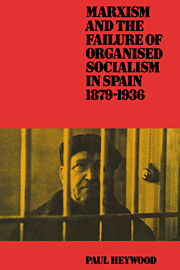Book contents
- Frontmatter
- Contents
- Preface
- Abbreviations used in text
- 1 Decaffeinated Marxists: the PSOE, 1879–1914
- 2 Reform, revolution and the roots of rupture: the PSOE, 1914–1919
- 3 Socialist schism and the development of organised Communism, 1919–1923
- 4 Dealing with a Dictator: organised Socialism, 1923–1931
- 5 Marxist mistakes: misinterpreting the Second Republic, 1931–1934
- 6 Marxism marginalised: the PSOE and the creation of the Popular Front, 1934–1936
- Conclusion
- Notes
- Bibliography
- Index
5 - Marxist mistakes: misinterpreting the Second Republic, 1931–1934
Published online by Cambridge University Press: 08 September 2009
- Frontmatter
- Contents
- Preface
- Abbreviations used in text
- 1 Decaffeinated Marxists: the PSOE, 1879–1914
- 2 Reform, revolution and the roots of rupture: the PSOE, 1914–1919
- 3 Socialist schism and the development of organised Communism, 1919–1923
- 4 Dealing with a Dictator: organised Socialism, 1923–1931
- 5 Marxist mistakes: misinterpreting the Second Republic, 1931–1934
- 6 Marxism marginalised: the PSOE and the creation of the Popular Front, 1934–1936
- Conclusion
- Notes
- Bibliography
- Index
Summary
When the Second Republic came into being on 14 April 1931, it seemed reasonable to assume that its main source of support would derive from the PSOE and its union body, the UGT. Their collaboration with the Dictatorship of Primo de Rivera had left them as the most viable and coherent political organisations within the post-Primo political panorama. Moreover, the Socialists had accepted three central ministries, Labour, Economy and Justice, in the new Provisional Government. However, even though the PSOE was the best organised political force in the new regime, in practice its intervention in major issues of state – relations with the Church, reform of the Armed Forces, foreign and financial policy – was to be only marginal. Instead, the leading role in legislation was left to the various Republican forces which made up the first government of the Second Republic in collaboration with the Socialists. The PSOE saw its position in terms of offering support to the Republic rather than of taking political initiatives. As an editorial in El Socialista explained on 26 April, the Republic did not represent their revolution; as soon as they had played their part in consolidating the new regime they would return to their task of organising the working class in order to challenge the bourgeoisie. Such an outlook highlighted the conceptual confusion which existed within the Socialist movement over the relationship between Socialism and democracy. While the Republic was welcomed as the long-awaited bourgeois revolution and deemed to be in need of Socialist support in order to ensure its survival, it was also ultimately an obstacle which needed to be overcome.
- Type
- Chapter
- Information
- Publisher: Cambridge University PressPrint publication year: 1990

